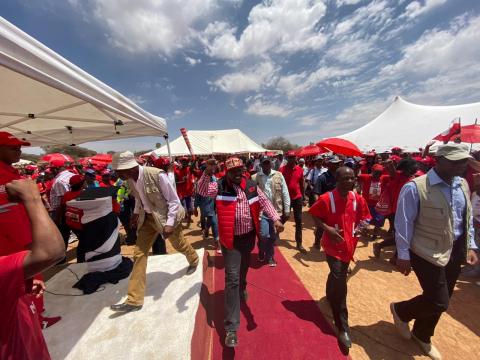Advertisement
Botswana votes in first real challenge to ruling party
GABORONE (Reuters) - Botswana voted on Wednesday in a general election that is expected to provide the first genuine challenge to the ruling Botswana Democratic Party (BDP) in its five decades of dominance over southern Africa's wealthiest and most stable nation.
Whichever party wins will have to move swiftly to transform the economy, which since independence from Britain in 1966 has grown at 8% a year to become one of Africa's most successful, but now risks coming unstuck because of over-reliance on a single commodity - diamonds.
Campaigning on promises to drive that economic transformation, Duma Boko, leader of the Umbrella for Democratic Change, is hoping to unseat the BDP of President Mokgweetsi Masisi. Boko is backed by former president Ian Khama, who handed over to Masisi last year but has since fallen into a bitter power struggle with him.
"I hope the people of Botswana ... will rewrite the history of this country, will write a different script for the economy," Boko said after voting in Gaborone, the capital. "It is an epic moment."
In the run up to the poll, he warned he would reject any results tainted by fraud, raising the spectre that Botswana, which has only known one-sided elections, could witness its first rancorous dispute over a tight result.
Of Botswana's population of 2.2 million people, 924,000 registered voters will elect 57 national assembly and 490 local government representatives.
The winning party's candidate then becomes president.
Polls opened at 6:30 a.m. (0430 GMT) and close at 7 p.m.
Masisi is standing on his record on tackling corruption, such as making a declaration of assets obligatory for public sector officials, and slashing bureaucracy for small businesses.
"We are going to ... tackle the challenges that the country is facing ... improving the value chain of our national products whether it's in tourism or minerals," Masisi said after voting in his home village of Moshupa. "This will help us achieve our goal of migrating towards a high-income country."
Khama, the son of founding president Seretse Khama, quarrelled with Masisi over cabinet posts and the new president's controversial scrapping of an elephant hunting ban in May, which Khama had enforced four years earlier. Elephants, however, have not been an issue during the campaign.
The main concerns for the Batswana are unemployment at around 20% and stark inequalities despite equitable state spending on health and education. To tackle either, the winner will need to do more to diversify the economy.
Mbakisi Gopolang, 25, waiting to vote at a primary school in Gaborone, said he was disappointed by the BDP.
"The last ten years have been regressive, so I don't want continuation of that. I am voting for a party that will drive economic growth, empower citizens and get rid of corruption and bring about transparency," he said.
Diamond mining fell to a fifth of GDP in 2018, compared with half in the 1990s, but it still makes up three quarters of foreign exchange earnings, even as banking and tourism command a greater share of output.
(Editing by Tim Cocks and Giles Elgood)



















Add new comment